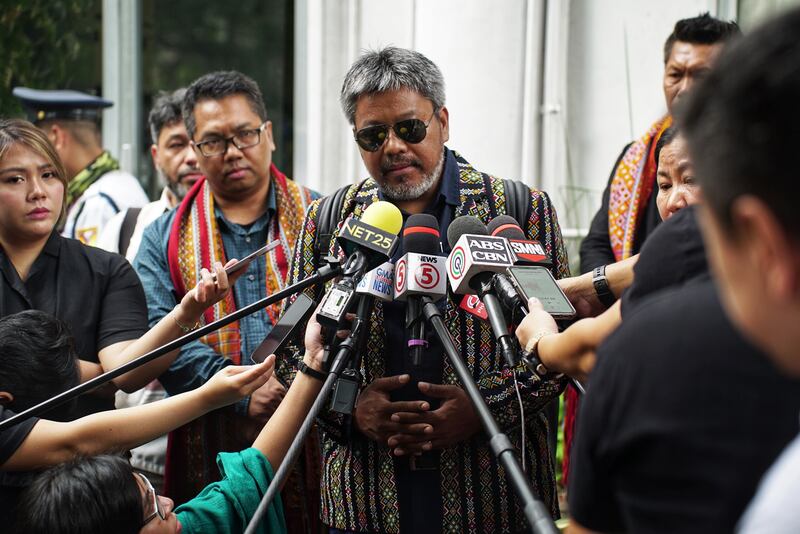UPDATED at 4:21 p.m. EDT on 2023-11-25
Five Myanmar nationals on Wednesday asked the Philippines’ Department of Justice to open a war crimes investigation into 10 members of the Burmese junta for a range of alleged atrocities, including the killing of civilians, mutilation of bodies and torching hundreds of homes and churches.
Senior Gen. Min Aung Hlaing, the junta chief whose forces ousted Aung San Suu Kyi’s elected government in a February 2021 coup, was named among the 10 targeted in the criminal complaint.
It comes two years after a mass arson attack by junta forces on the town of Thantlang, which was part of an offensive in Chin state in northwestern Myanmar that saw some 2,000 homes destroyed, at least 250 people killed and 60,000 driven into India, according to the plaintiffs and rights groups.
The alleged crimes committed in the region were “part of Myanmar’s forgotten war against the Chin,” said one of the complainants, Salai Za Uk Ling, who is also the deputy executive director of the Chin Human Rights Organization.
“We are a Christian people whose pastors are being murdered and whose churches and faith-based schools are being destroyed in a systematic campaign by junta forces,” Salai, who lives in exile in India, told a news conference in Manila.
“With this persecution of Myanmar’s Christians continuing, we pray that our brothers and sisters in the Philippines will hear our cry and grant us justice.”
Thantlang residents were quick to oppose the Feb. 1, 2021 military coup and by September of that year had formed several anti-junta People’s Defense Force groups, according to Radio Free Asia, a news service affiliated with BenarNews. Their resistance put them firmly in the sights of Myanmar’s feared military, known as the Tatmadaw.
Another claimant, Zing Ral Tu, described how her father Pul Ral Tu was shot and killed by junta troops in Thantlang in 2021 along with his friend, Pu Hram Cung.
The men, who were senior members of the local Baptist church, were transporting medicine for civilians fleeing the violence.
“We will never get justice through Burmese courts,” the 47-year-old said on Wednesday through tears. “We pray the Filipino people will hear our cry for help.”
Landmark case
But whether the claimants will find justice in the Philippines is far from certain.
Lawyers are relying on the principle of “universal jurisdiction,” a concept in international law that recognises that some crimes are so serious that they transcend borders and national courts can prosecute perpetrators. There is no precedent for such a case in the Philippines.
The claimants’ Filipino lawyers, Romel Bagares and Gilbert Andres, argue that the landmark Philippine Act on Crimes Against International Humanitarian Law obligates Manila to prosecute “war crimes” committed anywhere in the world.
“The law builds on a long humanitarian legal tradition in the Philippines,” said Andres in a statement. “It doesn’t matter that the crimes were committed by non-Filipinos against non-Filipinos outside Philippine territory.”
Prosecution in the Philippines would send a “strong statement” to the international community, he separately told BenarNews. However, he acknowledged the country’s notoriously backlogged justice system would be an obstacle.
“We can only hope and pray,” he said. “It is only up to the discretion of the DOJ. We hope that the prosecutors here are really up to the challenge.”
Speaking to RFA Burmese, Andres noted that this was the first time that universal jurisdiction had been invoked through the Filipino penal code, calling it a "history-making filing."
"I think the filing in itself will be a form of victims' rights, access to justice," he said. "The mere filing in itself [makes] a strong statement both for the Philippines and also for the Myanmar military junta, because, in fact, the Philippines has been declaring before the United Nations that we have universal jurisdiction and we have jurisprudence that says that there's no jurisdiction for war crimes."
Fellow lawyer Bagares said there was already a plethora of evidence gathered by the U.N.’s Independent Investigative Mechanism for Myanmar concerning the alleged crimes in Chin state, as well as by rights advocacy groups.
“We have also petitioned ASEAN to promote regional justice mechanisms and this case in the Philippines sends a powerful signal to our regional partners,” he said in a statement, referring to the Association of Southeast Asian Nations.

The Philippines is already struggling with its own allegations of human rights abuses after the blood-soaked presidency of Rodrigo Duterte between 2016-22.
His brutal war on suspected drug addicts and dealers left 8,000 dead. He now faces at least two cases before the International Criminal Court (ICC) for crimes against humanity, though he is not facing prosecution at home.
Duterte’s successor, Ferdinand Marcos Jr., meanwhile said at an ASEAN summit in September that the solution to the Myanmar crisis should be Myanmar-led.
Chris Gunness, the director of the Myanmar Accountability Project, which is supporting the case, said Philippine law “allows” the case to be heard in the country’s courts.
“If your house has been burned down, if your town has been destroyed, if 60,000 of your own people have been driven to another country … how desperate can you be?” Gunness told reporters.
He said this was an opportunity for Manila to show the world an image “rooted in the rule of law, in decency, democracy and Christian values,” rather than one where daily murders occurred under Duterte.”
RFA Burmese contributed to this report.
